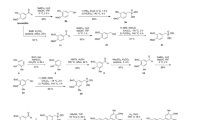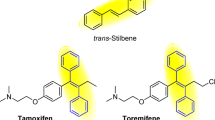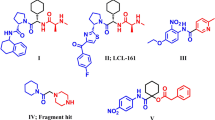Abstract
Resveratrol, a polyphenol found in grapes and other fruit and vegetables, is a powerful chemopreventive and chemotherapeutic molecule potentially of interest for the treatment of breast cancer. The human breast cancer cell line MCF-7, which is devoid of caspase-3 activity, is refractory to apoptotic cell death after incubation with resveratrol. Here we show that resveratrol arrests cell proliferation, triggers death and decreases the number of colonies of cells that are sensitive to caspase-3-dependent apoptosis (MCF-7casp-3) and also those that are unresponsive to it (MCF-7vc). We demonstrate that resveratrol (i) acts via multiple pathways to trigger cell death, (ii) induces caspase-dependent and caspase-independent cell death in MCF-7casp-3 cells, (iii) induces only caspase-independent cell death in MCF-7vc cells and (iv) stimulates macroautophagy. Using BECN1 and hVPS34 (human vacuolar protein sorting 34) small interfering RNAs, we demonstrate that resveratrol activates Beclin 1-independent autophagy in both cell lines, whereas cell death via this uncommon form of autophagy occurs only in MCF-7vc cells. We also show that this variant form of autophagic cell death is blocked by the expression of caspase-3, but not by its enzymatic activity. In conclusion, this study reveals that non-canonical autophagy induced by resveratrol can act as a caspase-independent cell death mechanism in breast cancer cells.
Similar content being viewed by others
Log in or create a free account to read this content
Gain free access to this article, as well as selected content from this journal and more on nature.com
or
Abbreviations
- Res:
-
resveratrol
- ATG:
-
autophagy-related genes
- C2-Cer:
-
C2-ceramide
- GFP:
-
green fluorescent protein
- LC3:
-
light chain 3
- 3-MA:
-
3-methyladenine
- Vps34:
-
vacuolar protein sorting 34
- PBS:
-
phosphate-buffered saline
- siRNA:
-
small interfering RNA
- PIC:
-
protease inhibitor mixture
- PARP:
-
poly(ADP-ribose) polymerase
- PI:
-
propidium iodide
- Pep A:
-
pepstatin A
- Ac-DEVD-pNA:
-
acetyl-Asp-Glu-Val-Asp p-nitroanilide
- PKB:
-
protein kinase B
- PI3K:
-
phosphoinositide 3-kinase
References
Klionsky DJ, Ohsumi Y . Vacuolar import of proteins and organelles from the cytoplasm. Annu Rev Cell Dev Biol 1999; 15: 1–32.
Mizushima N . The pleiotropic role of autophagy: from protein metabolism to bactericide. Cell Death Differ 2005; 12 (Suppl 2): 1535–1541.
Klionsky DJ, Cregg JM, Dunn Jr WA, Emr SD, Sakai Y, Sandoval IV et al. A unified nomenclature for yeast autophagy-related genes. Dev Cell 2003; 5: 539–545.
Clarke PG . Developmental cell death: morphological diversity and multiple mechanisms. Anat Embryol (Berl) 1990; 181: 195–213.
Kondo Y, Kanzawa T, Sawaya R, Kondo S . The role of autophagy in cancer development and response to therapy. Nat Rev Cancer 2005; 5: 726–734.
Scarlatti F, Sala G, Somenzi G, Signorelli P, Sacchi N, Ghidoni R . Resveratrol induces growth inhibition and apoptosis in metastatic breast cancer cells via de novo ceramide signaling. FASEB J 2003; 17: 2339–2341.
Signorelli P, Ghidoni R . Resveratrol as an anticancer nutrient: molecular basis, open questions and promises. J Nutr Biochem 2005; 16: 449–466.
Opipari Jr AW, Tan L, Boitano AE, Sorenson DR, Aurora A, Liu JR . Resveratrol-induced autophagocytosis in ovarian cancer cells. Cancer Res 2004; 64: 696–703.
Tessitore L, Davit A, Sarotto I, Caderni G . Resveratrol depresses the growth of colorectal aberrant crypt foci by affecting bax and p21(CIP) expression. Carcinogenesis 2000; 21: 1619–1622.
Carbo N, Costelli P, Baccino FM, Lopez-Soriano FJ, Argiles JM . Resveratrol, a natural product present in wine, decreases tumour growth in a rat tumour model. Biochem Biophys Res Commun 1999; 254: 739–743.
Baur JA, Sinclair DA . Therapeutic potential of resveratrol: the in vivo evidence. Nat Rev Drug Discov 2006; 5: 493–506.
Janicke RU, Sprengart ML, Wati MR, Porter AG . Caspase-3 is required for DNA fragmentation and morphological changes associated with apoptosis. J Biol Chem 1998; 273: 9357–9360.
Pozo-Guisado E, Merino JM, Mulero-Navarro S, Lorenzo-Benayas MJ, Centeno F, Alvarez-Barrientos A et al. Resveratrol-induced apoptosis in MCF-7 human breast cancer cells involves a caspase-independent mechanism with downregulation of Bcl-2 and NF-kappaB. Int J Cancer 2005; 115: 74–84.
Kim YA, Choi BT, Lee YT, Park DI, Rhee SH, Park KY et al. Resveratrol inhibits cell proliferation and induces apoptosis of human breast carcinoma MCF-7 cells. Oncol Rep 2004; 11: 441–446..
Li Y, Liu J, Liu X, Xing K, Wang Y, Li F et al. Resveratrol-induced cell inhibition of growth and apoptosis in MCF7 human breast cancer cells are associated with modulation of phosphorylated Akt and caspase-9. Appl Biochem Biotechnol 2006; 135: 181–192.
Kabeya Y, Mizushima N, Ueno T, Yamamoto A, Kirisako T, Noda T et al. LC3, a mammalian homologue of yeast Apg8p, is localized in autophagosome membranes after processing. EMBO J 2000; 19: 5720–5728.
Tanida I, Minematsu-Ikeguchi N, Ueno T, Kominami E . Lysosomal turnover, but not a cellular level, of endogenous LC3 is a marker for autophagy. Autophagy 2005; 1: 84–91.
Scarlatti F, Bauvy C, Ventruti A, Sala G, Cluzeaud F, Vandewalle A et al. Ceramide-mediated macroautophagy involves inhibition of protein kinase B and up-regulation of beclin 1. J Biol Chem 2004; 279: 18384–18391.
Han W, Li L, Qiu S, Lu Q, Pan Q, Gu Y et al. Shikonin circumvents cancer drug resistance by induction of a necroptotic death. Mol Cancer Ther 2007; 6: 1641–1649.
Nicholson DW, Ali A, Thornberry NA, Vaillancourt JP, Ding CK, Gallant M et al. Identification and inhibition of the ICE/CED-3 protease necessary for mammalian apoptosis. Nature 1995; 376: 37–43.
Rudel T, Bokoch GM . Membrane and morphological changes in apoptotic cells regulated by caspase-mediated activation of PAK2. Science 1997; 276: 1571–1574.
Devarajan E, Sahin AA, Chen JS, Krishnamurthy RR, Aggarwal N, Brun AM et al. Down-regulation of caspase 3 in breast cancer: a possible mechanism for chemoresistance. Oncogene 2002; 21: 8843–8851.
Woo M, Hakem R, Soengas MS, Duncan GS, Shahinian A, Kagi D et al. Essential contribution of caspase 3/CPP32 to apoptosis and its associated nuclear changes. Genes Dev 1998; 12: 806–819.
Kagawa S, Gu J, Honda T, McDonnell TJ, Swisher SG, Roth JA et al. Deficiency of caspase-3 in MCF7 cells blocks Bax-mediated nuclear fragmentation but not cell death. Clin Cancer Res 2001; 7: 1474–1480.
Paglin S, Lee NY, Nakar C, Fitzgerald M, Plotkin J, Deuel B et al. Rapamycin-sensitive pathway regulates mitochondrial membrane potential, autophagy, and survival in irradiated MCF-7 cells. Cancer Res 2005; 65: 11061–11070.
Kim KW, Mutter RW, Cao C, Albert JM, Freeman M, Hallahan DE et al. Autophagy for cancer therapy through inhibition of pro-apoptotic proteins and mammalian target of rapamycin signaling. J Biol Chem 2006; 281: 36883–36890.
Cao C, Subhawong T, Albert JM, Kim KW, Geng L, Sekhar KR et al. Inhibition of mammalian target of rapamycin or apoptotic pathway induces autophagy and radiosensitizes PTEN null prostate cancer cells. Cancer Res 2006; 66: 10040–10047.
Moretti L, Attia A, Kim KW, Lu B . Crosstalk between Bak/Bax and mTOR signaling regulates radiation-induced autophagy. Autophagy 2007; 3: 142–144.
Hsieh TC, Burfeind P, Laud K, Backer JM, Traganos F, Darzynkiewicz Z et al. Cell cycle effects and control of gene expression by resveratrol in human breast carcinoma cell lines with different metastatic potentials. Int J Oncol 1999; 15: 245–252.
Scifo C, Cardile V, Russo A, Consoli R, Vancheri C, Capasso F et al. Resveratrol and propolis as necrosis or apoptosis inducers in human prostate carcinoma cells. Oncol Res 2004; 14: 415–426.
Zhu JH, Horbinski C, Guo F, Watkins S, Uchiyama Y, Chu CT . Regulation of autophagy by extracellular signal-regulated protein kinases during 1-methyl-4-phenylpyridinium-induced cell death. Am J Pathol 2007; 170: 75–86.
Yano K, Hattori M, Moriyasu Y . A novel type of autophagy occurs together with vacuole genesis in miniprotoplasts prepared from tobacco culture cells. Autophagy 2007; 3: 215–221.
Pattingre S, Tassa A, Qu X, Garuti R, Liang XH, Mizushima N et al. Bcl-2 antiapoptotic proteins inhibit Beclin 1-dependent autophagy. Cell 2005; 122: 927–939.
Chan EY, Kir S, Tooze SA . siRNA screening of the kinome identifies ULK1 as a multidomain modulator of autophagy. J Biol Chem 2007; 282: 25464–25474.
Vandenabeele P, Vanden Berghe T, Festjens N . Caspase inhibitors promote alternative cell death pathways. Sci STKE 2006; 2006: pe44.
Faraglia B, Bonsignore A, Scaldaferri F, Boninsegna A, Cittadini A, Mancuso C et al. Caspase-3 inhibits the growth of breast cancer cells independent of protease activity. J Cell Physiol 2005; 202: 478–482.
Howitz KT, Bitterman KJ, Cohen HY, Lamming DW, Lavu S, Wood JG et al. Small molecule activators of sirtuins extend Saccharomyces cerevisiae lifespan. Nature 2003; 425: 191–196.
Meley D, Bauvy C, Houben-Weerts JH, Dubbelhuis PF, Helmond MT, Codogno P et al. AMP-activated protein kinase and the regulation of autophagic proteolysis. J Biol Chem 2006; 281: 34870–34879.
Kueck A, Opipari Jr AW, Griffith KA, Tan L, Choi M, Huang J et al. Resveratrol inhibits glucose metabolism in human ovarian cancer cells. Gynecol Oncol 2007; 107: 450–457.
Pattingre S, Petiot A, Codogno P . Analyses of Galpha-interacting protein and activator of G-protein-signaling-3 functions in macroautophagy. Methods Enzymol 2004; 390: 17–31.
Acknowledgements
We thank T Yoshimori for providing us GFP-LC3, PT Daniel for sharing human transfectant MCF-7vc and MCF-7casp-3 cells and William Dunn (University of Florida, Gainesville, FL, USA) for the Atg7 antibody. We are especially indebted to Riccarda Granata (University of Turin, Italy) for inestimable suggestions and critical reading of the manuscript. We wish to thank Dr. Iacopo Gesmundo (University of Turin) for excellent technical assistance with western blot. This study was supported by fellowships from FIRC (to Francesca Scarlatti) and University of Milan (to Roberta Maffei), by Institutional grants from University of Milan, INSERM and Université Paris Sud 11, and by research grants from the Association pour la Recherche sur le Cancer (no. 3503) in P Codogno's laboratory and from Fondazione Cariplo in R Ghidoni's laboratory.
Author information
Authors and Affiliations
Corresponding authors
Additional information
Edited by E Baehrecke
Addendum
While this manuscript was being revised, sirtuin 1, the target of resveratrol, was shown to regulate macroautophagy (Lee et al. Proc Natl Acad Sci USA 2008; 105: 3374–3379).
Supplementary Information accompanies the paper on Cell Death and Differentiation website (http://www.nature.com/cdd)
Rights and permissions
About this article
Cite this article
Scarlatti, F., Maffei, R., Beau, I. et al. Role of non-canonical Beclin 1-independent autophagy in cell death induced by resveratrol in human breast cancer cells. Cell Death Differ 15, 1318–1329 (2008). https://doi.org/10.1038/cdd.2008.51
Received:
Revised:
Accepted:
Published:
Issue date:
DOI: https://doi.org/10.1038/cdd.2008.51
Keywords
This article is cited by
-
Modelling porcine NAFLD by deletion of leptin and defining the role of AMPK in hepatic fibrosis
Cell & Bioscience (2023)
-
Octyl syringate is preferentially cytotoxic to cancer cells via lysosomal membrane permeabilization and autophagic flux inhibition
Cell Biology and Toxicology (2023)
-
Inhibitory effect of polyphenols (phenolic acids, lignans, and stilbenes) on cancer by regulating signal transduction pathways: a review
Clinical and Translational Oncology (2022)
-
Resveratrol in breast cancer treatment: from cellular effects to molecular mechanisms of action
Cellular and Molecular Life Sciences (2022)
-
Astragalus Polysaccharide Protects Against Cadmium-Induced Autophagy Injury Through Reactive Oxygen Species (ROS) Pathway in Chicken Embryo Fibroblast
Biological Trace Element Research (2022)



